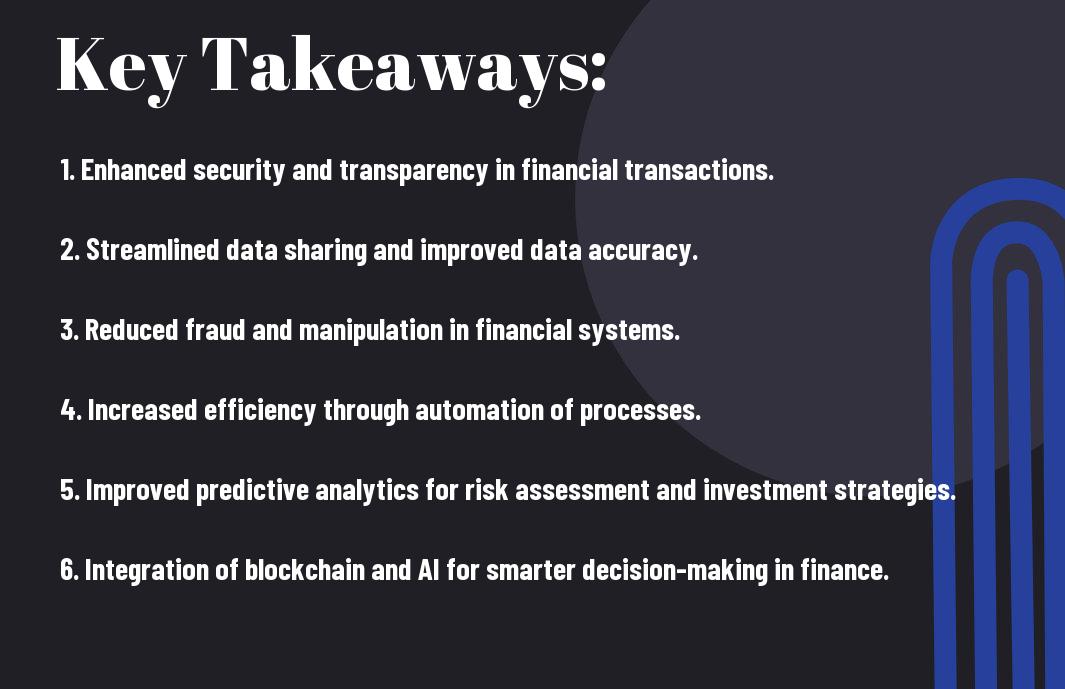Most experts agree that the intersection of blockchain technology and artificial intelligence (AI) is poised to revolutionize the financial industry. As highlighted in a recent article on How big data, AI and blockchain are changing finance, the merging of these two technologies has the potential to enhance security, transparency, and automation in financial processes. In this blog post, we will examine into the impact that blockchain technology will have on AI in finance, exploring the opportunities and challenges that lie ahead.
Key Takeaways:
- Enhanced Security: Blockchain technology provides a secure and tamper-resistant way to store and share data, which can enhance the security of AI applications in finance.
- Improved Transparency: The transparency of blockchain can help in building trust among users by providing a clear audit trail of data and transactions used in AI systems.
- Smart Contracts: Smart contracts are self-executing contracts with the terms of the agreement between buyer and seller being directly written into lines of code. Using blockchain, these contracts can automate transactions in AI-driven financial systems.
- Data Integrity: By using blockchain, AI systems can ensure the integrity of data used for training and decision-making processes, reducing the risk of data manipulation.
- Cost Efficiency: Implementing blockchain technology can lead to reduced costs in executing AI processes, as the decentralized nature of blockchain eliminates the need for intermediaries in transactions.
- Faster Transactions: The use of blockchain can enable faster and more efficient transactions in AI-powered financial applications by enabling real-time verification and settlement of transactions.
- Scalability: Blockchain technology offers scalability benefits, allowing AI applications in finance to handle vast amounts of data and transactions without compromising performance.


Fundamentals of Blockchain and AI in Finance
Blockchain Technology Explained
Finance has been revolutionized by Blockchain technology, which is a decentralized, distributed ledger that securely records transactions across a network of computers. This technology ensures transparency and immutability of data, making transactions more secure and efficient.
AI in Finance: How It Works
On the other hand, Artificial Intelligence (AI) in finance refers to the use of advanced algorithms and machine learning techniques to analyze large amounts of data, make predictions, and automate tasks. This technology enables financial institutions to improve decision-making processes, detect fraudulent activities, and provide personalized services to customers.
This combination of Blockchain and AI technologies in finance has the potential to streamline operations, reduce costs, enhance security, and improve customer experience. As these technologies continue to evolve, they will play a crucial role in shaping the future of the financial industry.
Synergy Between Blockchain and AI
Enhancing Security through Blockchain
For financial institutions, security is paramount in protecting sensitive data and preventing fraudulent activities. Blockchain technology offers a decentralized and tamper-proof way to store data, making it highly secure. By integrating AI algorithms with blockchain, financial organizations can enhance security measures even further. AI can continuously monitor transactions, detect suspicious behavior, and provide real-time alerts, adding an extra layer of protection against cyber threats.
Streamlining Decision-Making with AI
Decision-making in the financial sector requires timeliness and accuracy to capitalize on opportunities and mitigate risks effectively. AI has the capability to analyze vast amounts of data rapidly and identify meaningful patterns that humans may overlook. By leveraging AI in conjunction with blockchain, financial institutions can automate decision-making processes, streamline operations, and improve overall efficiency. This synergy between AI and blockchain not only enhances decision-making but also reduces human errors and bias.
Plus, AI can also assist in creating personalized services for customers by analyzing their preferences and behavior. This can lead to customized financial products and services that better meet the needs of individual clients, ultimately improving customer satisfaction and loyalty. The combination of AI and blockchain technology has the potential to revolutionize the financial industry by driving innovation, improving security, and optimizing business processes.
Transformative Impacts on Financial Services
Smart Contracts and Automated Compliance
Contracts in traditional finance are often time-consuming and costly to enforce. However, with blockchain technology, smart contracts can be created to automatically execute and enforce agreements when certain conditions are met. This automation streamlines processes, reduces human error, and ensures compliance with regulations in a more efficient and secure manner.
Fraud Detection and Risk Management
Services in financial institutions are increasingly utilizing AI and blockchain technology to enhance fraud detection and risk management capabilities. The combination of these technologies allows for real-time monitoring of transactions, identification of suspicious activities, and immediate response to security threats. By leveraging the transparency and immutability of blockchain, financial firms can enhance their security measures and protect against fraudulent activities.
The implementation of blockchain technology in financial services is revolutionizing the industry by providing unprecedented levels of security, transparency, and efficiency. By leveraging AI for fraud detection and risk management, financial institutions can enhance their ability to detect and prevent fraudulent activities in real-time, ultimately safeguarding their assets and maintaining trust with clients.
Challenges and Considerations
Scalability and Performance Issues
Many challenges arise when integrating blockchain technology with AI in finance, particularly in terms of scalability and performance. Any system built on blockchain must be able to handle the large volume of transactions associated with financial AI applications. This requires innovative solutions to ensure high performance and scalability while maintaining the security and integrity of the data.
Ethical and Privacy Concerns
Many ethical and privacy concerns surround the use of blockchain technology in conjunction with AI in financial applications. On one hand, the transparency and immutability of blockchain can enhance trust and accountability in financial transactions. On the other hand, the immutable nature of blockchain also raises questions about privacy and data protection. Additional considerations must be made to address these ethical and privacy concerns to ensure the responsible use of these technologies in finance.
Another consideration in ethical and privacy concerns is the potential for bias in AI algorithms used in financial decision-making processes. It is crucial to ensure that the data sets used to train AI models are unbiased and representative to avoid perpetuating existing inequalities and biases in the financial industry.
Summing up
On the whole, the integration of blockchain technology with AI in finance holds the potential to revolutionize the industry. By enhancing security, transparency, and efficiency, blockchain can streamline processes, reduce costs, and mitigate risks. AI algorithms powered by blockchain can provide data-driven insights, improve decision-making, and enable personalized customer experiences. The synergy between these technologies will likely lead to greater automation in various financial services, such as fraud detection, risk assessment, and smart contracts. As the adoption of these innovations continues to grow, the financial landscape is poised for significant transformation towards a more secure, efficient, and customer-centric environment.
FAQ
Q: What impact will blockchain technology have on AI in finance?
A: Blockchain technology is revolutionizing the finance industry by providing secure, efficient, and transparent transactions. When integrated with AI, it can enhance data security, streamline processes, and provide valuable insights for financial institutions.
Q: How does blockchain technology enhance data security in AI-powered finance?
A: Blockchain’s decentralized and immutable nature ensures that data stored on the network is secure from tampering or hacking attempts. This increased security allows AI algorithms to work with trusted data sources, reducing the risk of fraudulent activities.
Q: In what ways can blockchain technology streamline processes in AI-driven finance?
A: Blockchain enables faster and more efficient transactions by eliminating intermediaries and automating processes through smart contracts. This streamlining of operations can lead to cost savings and improved efficiency in financial tasks like settlements and trade confirmations.
Q: How can blockchain technology provide valuable insights for financial institutions when combined with AI?
A: By analyzing data stored on the blockchain, AI algorithms can identify patterns, trends, and anomalies that can help financial institutions make informed decisions. These insights can be crucial for risk management, fraud detection, and investment strategies.
Q: What are the potential challenges of integrating blockchain technology and AI in finance?
A: Some challenges include scalability issues, regulatory concerns, and the need for skilled professionals to manage complex systems. Additionally, ensuring interoperability between different blockchain networks and AI systems can be a hurdle that needs to be addressed for successful integration.